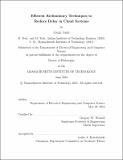Efficient redundancy techniques to reduce delay in Cloud systems
Author(s)
Joshi, Gauri
DownloadFull printable version (2.062Mb)
Other Contributors
Massachusetts Institute of Technology. Department of Electrical Engineering and Computer Science.
Advisor
Gregory W. Wornell.
Terms of use
Metadata
Show full item recordAbstract
Cloud services are changing the world by providing millions of people low-cost access to the computing power of data centers. Storing and processing data on shared servers in the cloud provides scalability and flexibility to these services. However the large-scale sharing of resources also causes unpredictable fluctuations in the response time of individual servers. In this thesis we use redundancy as a tool to combat this variability. We study three areas of cloud infrastructure: cloud computing, distributed storage, and streaming communication. In cloud computing, replicating a task on multiple machines and waiting for the earliest copy to finish can reduce service delay. But intuitively, it costs additional computing resources, and increases queueing load on the servers. In the first part of this thesis we analyze the eect of redundancy on queues. Surprisingly, there are regimes where replication not only reduces service delay but also reduces queueing load, thus making the system more ecient. Similarly, we can speed-up content download from cloud storage systems by requesting multiple replicas of a le and waiting for any one. In the second part of the thesis we generalize from replication to coding, and propose the (n, k) fork-join model to analyze the delay in accessing an (n, k) erasure-coded storage system. This analysis provides practical insights into how many users can access a piece of content simultaneously, and how fast they can be served. Achieving low latency is even more challenging in streaming communication because the packets need to be delivered fast and in-order. The third part of this thesis develops erasure codes to transmit redundant combinations of packets and ensure smooth playback. This thesis blends a diverse set of mathematical tools from queueing, coding theory, and renewal processes. Although we focus on cloud infrastructure, the techniques and insights are applicable to other systems with stochastically varying components.
Description
Thesis: Ph. D., Massachusetts Institute of Technology, Department of Electrical Engineering and Computer Science, 2016. This electronic version was submitted by the student author. The certified thesis is available in the Institute Archives and Special Collections. Cataloged from student-submitted PDF version of thesis. Includes bibliographical references (pages 197-209).
Date issued
2016Department
Massachusetts Institute of Technology. Department of Electrical Engineering and Computer SciencePublisher
Massachusetts Institute of Technology
Keywords
Electrical Engineering and Computer Science.